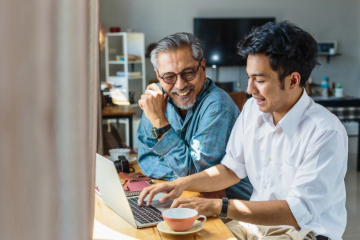
How financially fit are you?
UOB’s newly launched Financial Health Check is here to help you find out. Assess your financial preparedness against broad guidelines, benchmark yourself against peers, and take action where it matters.

Southeast Asia's first one-stop travel portal designed for UOB Cardmembers. Inspire, plan, and book your next adventure with UOB Cards.
Find out more
Skip to higher interest of up to 4.5% p.a. interest in just two steps. T&Cs apply. Insured up to S$100k by SDIC.
Find out more
Tap your way to 0% FX fees, cashback on MYR spend and instant savings with UNI$ redemption.
Find out more
Get instant cash at 0% interest and low processing fees. Choose from 3, 6 and 12-months tenor.
Find out more
Invest in funds powered by Private Bank CIO – United CIO Income Fund and United CIO Growth Fund.
Learn more
Meet UOB TMRW, the all-in-one banking app built around you and your needs.
Bank. Invest. Reward. Make TMRW yours.
you are in Personal Banking

19 Sep 2025 • 3 MIN READ

18 Sep 2025 • 3 min read

02 Jul 2025 • 5 min read

26 Jun 2025 • 5 MIN READ

15 May 2025 • 4 min read

08 May 2025 • 3 min read

11 Apr 2025 • 4 MIN READ

10 Mar 2025 • 4 MIN READ

10 Mar 2025 • 4 MIN READ

10 Mar 2025 • 4 min read

10 Mar 2025 • 4 min read

10 Mar 2025 • 4 MIN READ


Stay informed as we break down common scam types, how scammers work, how to identify scams, and what to do to protect yourself.

Whether you're saving for retirement, supporting your family, or just trying to stretch your dollar further, this session will equip you with the knowledge and tools to make better financial decisions.

Stay informed as we break down common scam types, how scammers work, how to identify scams, and what to do to protect yourself.

Whether you're saving for retirement, supporting your family, or just trying to stretch your dollar further, this session will equip you with the knowledge and tools to make better financial decisions.
This publication shall not be regarded as an offer, recommendation, solicitation or advice to buy or sell any investment product and shall not be transmitted, disclosed, copied or relied upon by any person for whatever purpose. Any description of investment products is qualified in its entirety by the terms and conditions of the investment product and if applicable, the prospectus or constituting document of the investment product. Nothing in this document constitutes accounting, legal, regulatory, tax, financial or other advice. If in doubt, you should consult your own professional advisers about issues discussed herein.
The information contained in this publication, including any data, projections and underlying assumptions, are based on certain assumptions, management forecasts and analysis of known information and reflects prevailing conditions as of the date of the article, all of which are subject to change at any time without notice. Although every reasonable care has been taken to ensure the accuracy and objectivity of the information contained in this publication, United Overseas Bank Limited (“UOB”) and its employees make no representation or warranty of any kind, express, implied or statutory, and shall not be responsible or liable for its completeness or accuracy. As such, UOB and its employees accept no liability for any error, inaccuracy, omission or any consequence or any loss/damage howsoever suffered by any person, arising from any reliance by any person on the views expressed or information in this publication.
Singapore dollar deposits of non-bank depositors and monies and deposits denominated in Singapore dollars under the Supplementary Retirement Scheme are insured by the Singapore Deposit Insurance Corporation, for up to S$100,000 in aggregate per depositor per Scheme member by law. Monies and deposits denominated in Singapore dollars under the CPF Investment Scheme and CPF Retirement Sum Scheme are aggregated and separately insured up to S$100,000 for each depositor per Scheme member. Foreign currency deposits, dual currency investments, structured deposits and other investment products are not insured.
Please refer to UOB Insured Deposit Register for a list of UOB accounts / products that are covered under the Scheme.

UOB’s newly launched Financial Health Check is here to help you find out. Assess your financial preparedness against broad guidelines, benchmark yourself against peers, and take action where it matters.
Follow our socials for more
UOB Instagram: Weekly Financial Literacy tips
UOB TikTok: Ask a Banker on Inflation
UOB TikTok: A Tip for A Tip
UOB YouTube: Learn about structured products
UOB YouTube: Learn about foreign currency bonds